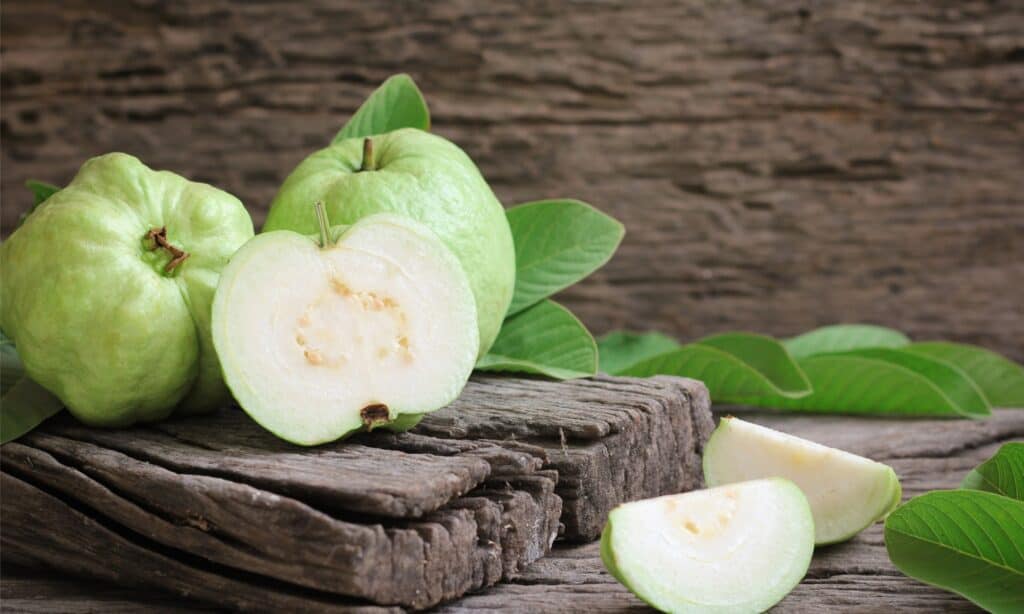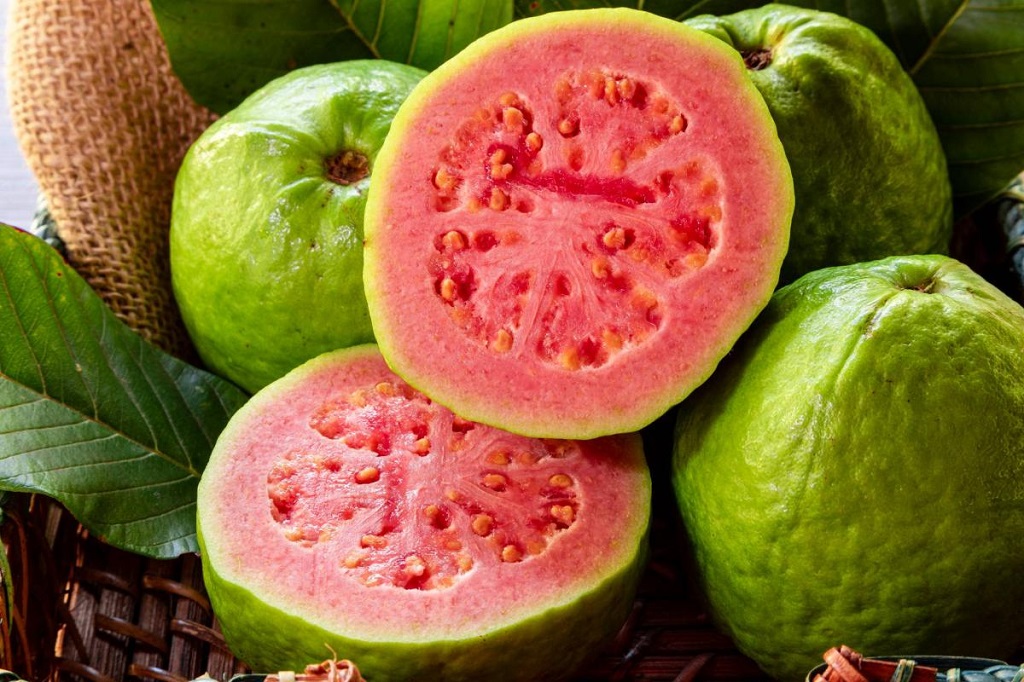Hey there, fellow dog lovers! We all know how our furry friends are often intrigued by whatever we’re munching on. It’s hard to resist those puppy-dog eyes when they beg for a taste of your delicious snacks. But when it comes to sharing our favorite fruits like guava, we might hesitate. So, the big question is, can dogs eat guava?
In this comprehensive guide, we’ll explore the world of guava, its nutritional value, potential benefits, and the risks it might pose to your canine companion. Let’s dive into this juicy topic and find out whether guava is a fruity delight or a potential hazard for your four-legged friend.
Guava – A Brief Introduction
Before we start discussing whether guava is safe for dogs, let’s get to know the star of the show – guava itself.
Guava, scientifically known as Psidium guajava, is a tropical fruit that’s beloved by humans for its sweet and slightly tangy taste. It’s loaded with essential nutrients like vitamin C, vitamin A, fiber, and antioxidants, making it a nutritious addition to our diets.
This fruit, which comes in green or pink, has a distinctive flavor that people enjoy fresh, juiced, or added to dishes and desserts. However, if you’re a pet owner, you may be wondering why does my dog pee on his blanket. While guava is beneficial for dogs, it’s important to remember that moderation is key. Additionally, if your furry friend pees on their blanket, there could be various reasons why. It’s essential to investigate to ensure your dog’s health and wellbeing.
The Nutritional Benefits of Guava
Before we delve into whether guava is safe for dogs, let’s take a moment to appreciate its nutritional value. Guava is packed with vitamins, minerals, and other beneficial compounds that can be quite healthy for humans. Here’s a breakdown of some of its key nutrients:
- Vitamin C: Guava is renowned for its high vitamin C content, which supports the immune system, promotes healthy skin, and aids in collagen production.
- Fiber: This fruit is a fantastic source of dietary fiber, which helps with digestion, prevents constipation, and maintains a healthy weight.
- Vitamin A: Guava contains vitamin A, vital for maintaining good vision, a strong immune system, and healthy skin and coat.
- Antioxidants: The fruit is rich in antioxidants like lycopene and beta-carotene, which can help reduce oxidative stress and lower the risk of chronic diseases.
- Potassium: Guava provides a good dose of potassium, essential for maintaining healthy heart function and regulating blood pressure.
- Folate: Folate, or vitamin B9, is present in guava and plays a role in DNA synthesis and repair.
Now, you might be wondering if these benefits extend to your furry friend. Let’s find out!
Can Dogs Eat Guava?
The million-dollar question: Can dogs eat guava? Well, the answer isn’t as straightforward as you might think. While guava is not toxic to dogs and does offer some potential health benefits, there are crucial considerations to keep in mind. Here we explain Why Can’t Dogs Have Avocados?
Guava as an Occasional Treat
Yes, your dog can enjoy a small amount of guava as an occasional treat. It’s not harmful in small quantities and can be a refreshing and nutritious snack. However, moderation is key. Too much guava at once can lead to digestive issues or an upset stomach for your furry friend.
The Role of Fiber
One of the benefits of guava for humans is its fiber content, which aids digestion. Interestingly, this aspect can be beneficial for dogs as well, especially if your pooch struggles with constipation. The fiber in guava can help regulate bowel movements, but again, it should be given in moderation.
Beware of Seeds
Guava contains small, hard seeds that could pose a choking hazard or cause digestive discomfort if ingested by your dog. So, it’s crucial to remove all the seeds before sharing this fruit with your pet.
Guava Allergies
Just like people, dogs can have food allergies. While guava allergies in dogs are relatively rare, they can still occur. To check if your dog is allergic, introduce a tiny piece of guava and monitor for any adverse reactions like itching, vomiting, or diarrhea. If any of these symptoms occur, refrain from feeding guava to your dog.
Preparing Guava for Your Dog
If you decide to share guava with your pup, make sure to prepare it properly. Peel the fruit and remove all the seeds before cutting it into small, bite-sized pieces. This minimizes the risk of choking or digestive issues.
Potential Benefits of Guava for Dogs
Now that we know dogs can eat guava in moderation, let’s explore some potential benefits your furry friend can enjoy:
1. Nutrient Boost
Guava is a nutritional powerhouse, and when given in small quantities, it can provide your dog with a boost of essential vitamins and minerals. Vitamin C, for instance, can help support your dog’s immune system.
2. Digestive Health
The fiber in guava can aid digestion and help regulate your dog’s bowel movements. If your dog occasionally suffers from constipation, a bit of guava may provide relief.
3. Antioxidant Protection
Guava contains antioxidants like lycopene and beta-carotene, which can help reduce oxidative stress in your dog’s body. This may contribute to overall health and potentially lower the risk of chronic diseases.
4. Hydration
Guava has a high water content, which can help keep your dog hydrated, especially on hot days. It’s like nature’s refreshing snack!
5. Low in Calories
If you’re watching your dog’s weight, guava can be a good option for a low-calorie treat. It’s a guilt-free way to satisfy your pup’s craving for something sweet.
Risks and Considerations
While guava can offer some health benefits for dogs, there are also risks and considerations you need to be aware of:
1. Sugar Content
Guava, like many fruits, contains natural sugars. Too much sugar in your dog’s diet can lead to weight gain and dental issues. Ensure guava is an occasional treat and not a regular part of their diet.
2. Allergies
As mentioned earlier, some dogs might be allergic to guava. Always introduce new foods gradually and monitor for any adverse reactions.
3. Choking Hazard
The small seeds in guava can pose a choking hazard, so be diligent about removing them before feeding guava to your dog.
4. Portion Control
Guava should only be given in small, bite-sized pieces. Feeding your dog large amounts of guava can lead to digestive upset.
5. Individual Sensitivity
Every dog is unique, and what works for one may not work for another. Some dogs may tolerate guava well, while others may not. Pay attention to your dog’s reaction and adjust accordingly.
When to Avoid Guava
While guava is generally safe for dogs in moderation, there are situations when it’s best to avoid giving them this tropical fruit:
1. Medical Conditions
If your dog has diabetes, obesity, or any other medical condition that requires a controlled diet, it’s best to consult your veterinarian before introducing guava into their diet.
2. Medications
If your dog is on medication, especially for a specific health condition, consult your vet before adding guava to their diet. Certain medications can interact with the nutrients in guava.
3. Young Puppies
Puppies have delicate digestive systems, and introducing new foods too early can lead to gastrointestinal issues. It’s advisable to wait until your puppy is a bit older before offering them guava.
4. Older Dogs
Senior dogs may have more sensitive digestive systems or dental issues. Be cautious when feeding guava to older dogs and consult your vet if you have any concerns.
5. Overindulgence
As with any treat, it’s essential not to overindulge your dog with guava. Excessive consumption can lead to digestive discomfort.
Conclusion
So, can dogs eat guava? The answer is a cautious yes, with a few important caveats. Guava can be a tasty and nutritious treat for your canine companion when offered in moderation and prepared correctly. It can provide them with a range of essential vitamins and minerals while potentially supporting their digestive health and overall well-being.
However, it’s crucial to be mindful of the potential risks, including choking hazards, allergies, and the sugar content in guava. Always consult your veterinarian if you have any concerns about introducing new foods into your dog’s diet, especially if they have underlying health conditions or are on medication.
FAQs
1. Can dogs eat guava skin?
No, it’s best to peel guava before offering it to your dog. The skin can be tough and difficult to digest for your furry friend.
2. Can guava seeds harm my dog?
Yes, guava seeds can pose a choking hazard and may cause digestive discomfort. Always remove the seeds before feeding guava to your dog.
3. How much guava can I give to my dog?
It’s essential to offer guava in moderation. For small dogs, a small bite-sized piece is sufficient, while larger dogs can have a slightly larger portion. Remember, it should be an occasional treat, not a regular part of their diet.
4. Can guava replace my dog’s regular treats?
No, guava should not replace your dog’s regular treats. While it can be a healthy addition to their treat rotation, it should not replace the balanced dog food they need for their overall nutrition.
5. What should I do if my dog shows signs of an allergic reaction to guava?
If your dog exhibits symptoms like itching, vomiting, diarrhea, or any other unusual reactions after eating guava, stop giving it to them immediately. Consult your veterinarian for guidance on managing the allergic reaction.



